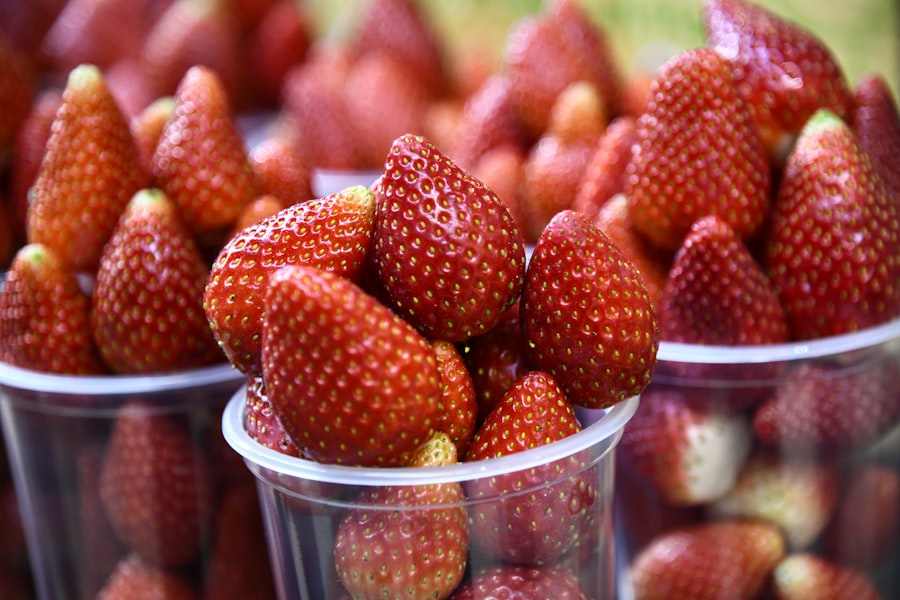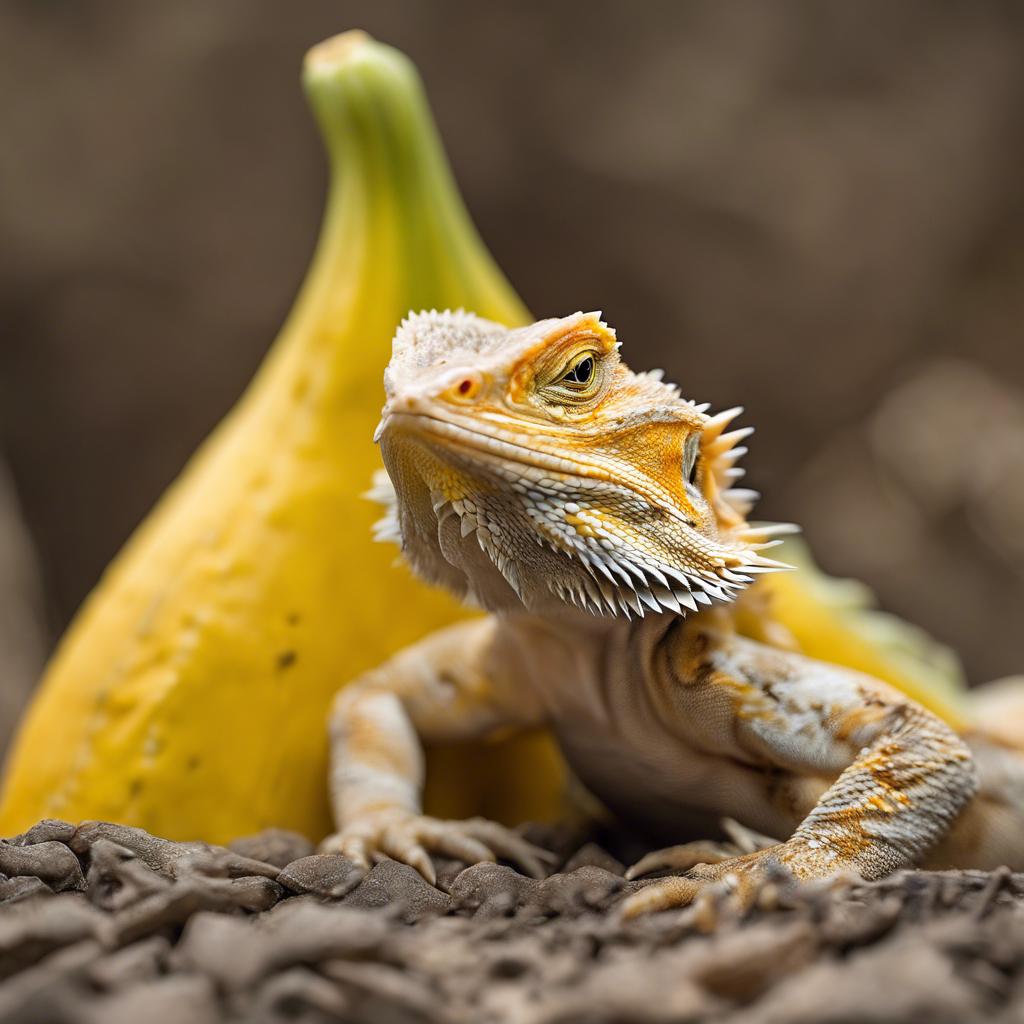Bearded dragons are popular reptile pets known for their unique appearance and docile nature. These lizards are native to Australia and have become increasingly popular as pets due to their low maintenance requirements and friendly demeanor. One of the most important aspects of caring for a bearded dragon is providing them with a balanced diet that meets their nutritional needs.
A balanced diet is crucial for the overall health and well-being of bearded dragons. These reptiles require a combination of protein, vegetables, fruits, and supplements to thrive. A proper diet ensures that they receive the necessary nutrients to support their growth, maintain a healthy weight, and prevent common health issues.
Key Takeaways
- Bearded dragons require a balanced diet of vegetables, fruits, and insects.
- Yellow squash is a nutritious vegetable that can be included in a bearded dragon's diet.
- Yellow squash should be washed, peeled, and cut into small pieces before feeding to bearded dragons.
- Bearded dragons should only consume yellow squash in moderation, as too much can lead to health issues.
- Other vegetables, such as collard greens and carrots, can also be included in a bearded dragon's diet for variety and nutritional balance.
Nutritional Value of Yellow Squash for Bearded Dragons
Yellow squash is a nutritious vegetable that can be a valuable addition to a bearded dragon's diet. It is low in calories and high in essential vitamins and minerals. Yellow squash is an excellent source of vitamin C, which helps boost the immune system and promote overall health. It also contains vitamin A, which is essential for maintaining healthy skin, eyesight, and reproductive function.
In addition to vitamins, yellow squash is rich in minerals such as potassium, magnesium, and calcium. Potassium helps regulate blood pressure and maintain proper heart function, while magnesium supports bone health and muscle function. Calcium is crucial for bearded dragons as it aids in the development and maintenance of strong bones and teeth.
Preparing Yellow Squash for Bearded Dragons
Before feeding yellow squash to your bearded dragon, it is important to properly wash and prepare the vegetable. Start by rinsing the squash under cool water to remove any dirt or debris. Next, use a clean knife or vegetable peeler to remove the skin if desired. While the skin is safe for consumption, some bearded dragons may have difficulty digesting it.
Once the squash is clean, you can cut it into small, bite-sized pieces. Bearded dragons have small mouths and may struggle to eat large chunks of food. Cutting the squash into smaller pieces makes it easier for them to consume and digest. Alternatively, you can cook the squash to soften it and make it more palatable for your pet.
How Much Yellow Squash Should Bearded Dragons Eat?
The amount of yellow squash a bearded dragon should eat depends on its age and size. As a general guideline, adult bearded dragons can be fed approximately 10-20% of their diet in vegetables, including yellow squash. Juvenile bearded dragons, on the other hand, should have a higher vegetable intake, making up around 30-40% of their diet.
It is important to note that bearded dragons have different dietary needs at different stages of their life. Younger dragons require more protein for growth, while adult dragons benefit from a higher vegetable content to maintain a healthy weight. It is recommended to consult with a reptile veterinarian or do thorough research to determine the appropriate serving sizes for your specific dragon.
In terms of frequency, bearded dragons should be fed vegetables daily. However, it is important to vary their diet and include a variety of vegetables to ensure they receive a wide range of nutrients.
Alternatives to Yellow Squash for Bearded Dragons
While yellow squash is a nutritious vegetable for bearded dragons, it is important to provide them with a diverse diet that includes other vegetables and fruits. Some other vegetables that can be included in their diet are collard greens, kale, bell peppers, carrots, and butternut squash. These vegetables provide additional vitamins and minerals that contribute to their overall health.
Fruits can also be offered as occasional treats for bearded dragons. Some safe fruits include strawberries, blueberries, raspberries, and mangoes. However, fruits should be given in moderation due to their high sugar content.
It is important to note that there are certain foods that should be avoided when feeding bearded dragons. These include toxic plants such as avocado, rhubarb, and onions. Additionally, high-fat and high-sugar foods should be avoided as they can lead to obesity and other health issues.
Tips for Feeding Yellow Squash to Bearded Dragons

Introducing new foods to a bearded dragon's diet can be a gradual process. Start by offering small amounts of yellow squash alongside their regular diet. Observe their response and monitor for any signs of digestive upset or allergic reactions. If your dragon shows no adverse reactions, you can gradually increase the amount of yellow squash in their diet.
It is important to monitor your bearded dragon's food intake and adjust accordingly. Some dragons may have preferences for certain vegetables or fruits, while others may not show interest in certain foods. It is important to offer a variety of options and ensure they are receiving a balanced diet.
Common Health Issues in Bearded Dragons and How Diet Affects Them
Bearded dragons are susceptible to various health issues, many of which can be prevented or managed through proper nutrition. One common health issue in bearded dragons is metabolic bone disease (MBD), which is caused by a lack of calcium and vitamin D3 in their diet. MBD can lead to weak bones, deformities, and even death if left untreated.
Another common issue is obesity, which can result from an imbalanced diet or overfeeding. Obesity can lead to a range of health problems, including fatty liver disease, heart disease, and joint issues. Providing a balanced diet with appropriate portion sizes is crucial for maintaining a healthy weight in bearded dragons.
Signs of Nutritional Deficiencies in Bearded Dragons
It is important to be aware of the signs of nutritional deficiencies in bearded dragons so that appropriate adjustments can be made to their diet. Some common signs of nutritional deficiencies include:
– Soft or deformed bones
– Difficulty shedding skin
– Weakness or lethargy
– Loss of appetite
– Weight loss
– Abnormal growth patterns
If you notice any of these symptoms in your bearded dragon, it is important to consult with a reptile veterinarian to determine the underlying cause and make necessary changes to their diet.
Supplementing Bearded Dragons' Diet with Vitamins and Minerals
While a balanced diet should provide most of the necessary vitamins and minerals for bearded dragons, it may be necessary to supplement their diet to ensure they are receiving adequate nutrition. Calcium and vitamin D3 are particularly important for bearded dragons, as they play a crucial role in bone health.
There are various calcium and vitamin D3 supplements available specifically for reptiles. These supplements can be dusted onto their food or provided in the form of liquid drops. It is important to follow the recommended dosage instructions provided by the manufacturer and consult with a reptile veterinarian if you have any concerns.
Balancing Bearded Dragons' Diet and Care for Optimal Health
In conclusion, providing a balanced diet is essential for the health and well-being of bearded dragons. Yellow squash is a nutritious vegetable that can be included in their diet to provide essential vitamins and minerals. However, it is important to offer a variety of vegetables and fruits to ensure they receive a wide range of nutrients.
Monitoring their food intake, adjusting portion sizes based on age and size, and introducing new foods gradually are all important aspects of caring for bearded dragons. Additionally, supplementing their diet with necessary vitamins and minerals can help prevent nutritional deficiencies and promote optimal health.
By providing a balanced diet, along with proper care and attention, you can ensure that your bearded dragon lives a long, healthy, and happy life.
If you're curious about what other foods are safe for your bearded dragon, you might want to check out this informative article on Reptile Wizard. They discuss whether bearded dragons can eat yellow squash and provide valuable insights into the nutritional benefits and potential risks associated with this vegetable. To learn more, click here: Can Bearded Dragons Eat Yellow Squash?
FAQs
What is a bearded dragon?
A bearded dragon is a type of lizard that is commonly kept as a pet. They are native to Australia and are known for their distinctive spiny “beard” under their chin.
What is yellow squash?
Yellow squash is a type of summer squash that is typically yellow in color and has a slightly sweet flavor. It is often used in cooking and can be eaten raw or cooked.
Can bearded dragons eat yellow squash?
Yes, bearded dragons can eat yellow squash. It is a safe and nutritious food for them to consume.
What are the nutritional benefits of yellow squash for bearded dragons?
Yellow squash is a good source of vitamins A and C, as well as potassium and fiber. These nutrients can help support a bearded dragon's overall health and well-being.
How should yellow squash be prepared for bearded dragons?
Yellow squash should be washed thoroughly and cut into small, bite-sized pieces before being fed to a bearded dragon. It can be served raw or cooked, but should not be seasoned with any spices or oils.
Can bearded dragons eat other types of squash?
Yes, bearded dragons can eat other types of squash, such as zucchini and butternut squash. These types of squash are also safe and nutritious for them to consume.

